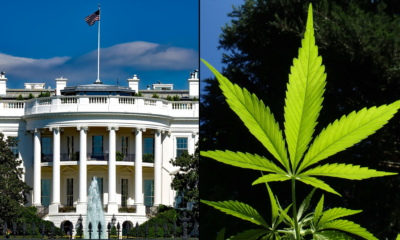Politics
Delaware Governor Dodges Question About Vetoing Marijuana Legalization Bills

The Democratic governor of Delaware won’t say whether he plans to sign or veto a pair of bills the legislature sent to his desk this week to legalize marijuana and establish a regulated adult-use market.
Advocates are closely watching to see if Gov. John Carney (D) will again exercise his veto authority to quash cannabis legalization, as he did last year.
Asked on Wednesday whether he could give a “hint” about his current thinking about the reform measures that the Senate passed on Tuesday, Carney said, “No, I’d rather focus on” his administration’s efforts to improve roadway safety.
“Obviously I’m concerned mostly about unintended consequences of legalization, including highway safety,” the governor told NBC Philadelphia.
I did ask Delaware Governor if he was ready to give me a hint if he will sign or again veto recreational marijuana laws that just passed. Spoiler alert- he wasn’t ready to tell me. #netde @NBCPhiladelphia pic.twitter.com/muzWU7Y3yf
— Tim Furlong (@tfurlong) March 29, 2023
A spokesperson for Carney made similar comments, telling Marijuana Moment on Tuesday that the governor “continues to have strong concerns about the unintended consequences of legalizing marijuana for recreational use in our state, especially about the impacts on our young people and highway safety.”
“He knows others have honest disagreements on this issue,” the communications director said. “But we don’t have anything new to share today about how the governor will act on HB 1 and HB 2 if they reach his desk.”
While the House didn’t have the votes to override Carney last year, both the simple legalization bill and the sales regulation measure cleared both chambers this round with more than enough support to override any potential veto.
Rep. Ed Osienski (D), sponsor of the bills, took a similar, bifurcated approach for the reform last session and saw the legislature pass the basic legalization proposal while narrowly defeating the regulatory measure.
The lawmaker recently said that if the governor seeks to veto the legislation again this time, he’s “optimistic” and feels “pretty good” that they have the votes for an override.
“I think my colleagues are saying, ‘OK, you know, you had one shot at vetoing this, you did and you were successful, but don’t count on us supporting that veto again,’” he said.
Here’s what the HB 1 legalization bill would accomplish:
State statute would be revised to legalize the possession, use, sharing and purchasing of up to one ounce of cannabis for adults 21 and older.
To avoid abuses of the “gifting” provision, the bill stipulates that “adult sharing” would not include giving away cannabis “contemporaneously with another reciprocal transaction between the same parties” such as an exchange of a non-marijuana item.
Public consumption and growing cannabis would remain prohibited.
People under 21 who engage in such activity would be subject to a civil penalty of up to $100 for a first offense. Police could use discretion and issue a citation in lieu of that fine, however.
Here’s an overview of the key provisions of the HB 2 regulatory bill:
The legislation would provide a basic framework to create a regulated system of cannabis commerce for adults in the state.
The Division of Alcohol and Tobacco Enforcement (DATE) would be responsible for regulating the market through a new Office of Marijuana Control Commissioner.
For the first 16 months of implementation, regulators could approve up to 30 cannabis retail licenses.
Applicants who show that they’d provide a living wage, health insurance coverage, sick and paid leave and focus on diversity in hiring would be prioritized in the licensing scoring process.
Seven percent of marijuana business fee revenue would go to a “Justice Reinvestment Fund” that supports restorative justice, workforce development, technical assistance for economically disadvantaged people and more.
That fund would also go toward “creating or developing technology to assist with the restoration of civil rights and expungement of criminal records.” However, the legislation itself doesn’t provide for automatic expungements.
In additional to conventional retail, cultivator, manufacturer and laboratory licenses, the bill would additional provide for social equity and microbusiness licenses (reserved for applicants with majority ownership by Delaware residents).
Localities would be able to prohibit marijuana businesses from operating in their area through ordinance.
Adult-use marijuana sales would be subject to a 15 percent sales tax. Medical cannabis products would not be taxed.
—
Marijuana Moment is tracking more than 1,000 cannabis, psychedelics and drug policy bills in state legislatures and Congress this year. Patreon supporters pledging at least $25/month get access to our interactive maps, charts and hearing calendar so they don’t miss any developments.
![]()
Learn more about our marijuana bill tracker and become a supporter on Patreon to get access.
—
Shortly after the House passed the latest versions of the legalization measures last week, the Senate approved a resolution that urges the state’s congressional representatives to support legislation to end federal cannabis prohibition.
Separately, in October, Carney vetoed a more narrowly tailored bill that would have clarified that medical marijuana patients are not prohibited from buying, possessing or transferring firearms under state law
A strong majority of Delaware voters support legalizing marijuana—including nearly three in four Democrats who back the reform that the state’s Democratic governor vetoed last year, according to a poll released that month.
















